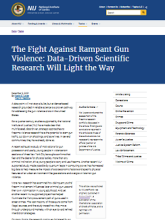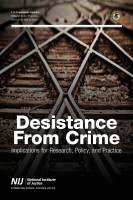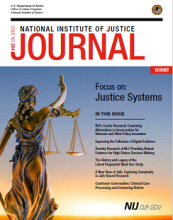Criminal justice research
Desistance From Crime: Implications for Research, Policy, and Practice
Most scholars would agree that desistance from crime – the process of ceasing engagement in criminal activities – is normative. However, there is variability in the literature regarding the definition and measurement of desistance, the signals of desistance, the age at which desistance begins, and the underlying mechanisms that lead to desistance. Even with considerable advances in the theoretical understanding of desistance from crime, there remain critical gaps between research and the application of that research to practice.
See the YouTube Terms of Service and Google Privacy Policy
NIJ Multisite Impact and Cost-Efficiency Evaluation of Veterans Treatment Courts, Fiscal Year 2022
Deadline Notice
The deadline for the funding opportunity discussed in this video has passed.
See the YouTube Terms of Service and Google Privacy Policy
THE TULALIP TRIBAL JUSTICE SYSTEM: A PATH TO WELLNESS
Police Response to Civil Disturbances: Understanding Strengths, Challenges, and Organizational Learning through After Action Reports
Breaking the School-to-Prison Pipeline: Implications of Removing Police from Schools for Racial and Ethnic Disparities in the Justice System
Forensic Technology Center of Excellence, Fiscal Year 2021
Evaluating Bioinformatic Pipeline Performance for Forensic Microbiome Analysis
NIJ-Funded Research on Mass Shootings to Advance Evidence-based Policy and Practice
NIJ Funded Research on Firearms Violence in Urban Cities: Advancing Scientific Evidence to Inform Practice
Desistance From Crime: Implications for Research, Policy, and Practice
Trauma and Coping Mechanisms Exhibited by Forensic Science Practitioners: A Literature Review
Crime frames and gender differences in the activation of crime concern and crime responses
Desistance From Crime: Implications for Research, Policy, and Practice
Assessing The Evidence: How Systems That Address Intimate Partner Violence Evaluate The Credibility And Utility Of Research Findings
Changing the Criminal Justice System Response to Sexual Assault: An Empirical Study of a Participatory Action Research Project
NIJ Journal Issue No. 284: Focus on Justice Systems
School Safety Considerations for Distinct Student Populations - Breakout Session, NIJ Virtual Conference on School Safety
On February 16-18, 2021, the National Institute of Justice hosted the Virtual Conference on School Safety: Bridging Research to Practice to Safeguard Our Schools. This video includes the following presentations:
See the YouTube Terms of Service and Google Privacy Policy
Review and Revalidation of the First Step Act Risk Assessment Tool
Benefits and Limitations of the Statistical Methodology in Determining Evidentiary Value of Latent Print Identification: A Prospective Evaluation
Webinar: Research Assistantship Program, Academic Year 2021-2022
NIJ held a webinar on November 12, 2020, to discuss the academic year 2021-2022 Research Assistantship Program. The following is a transcript of that webinar.
Full Transcript
ANGELA M. MOORE: Good afternoon, everyone. Before we get into the meat of the presentation, I first want to thank everyone for joining us and for your interest in NIJ's Research Assistantship Program. In addition, I just want to...




